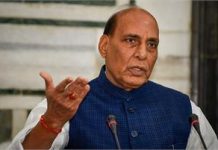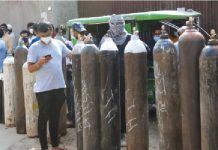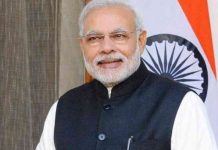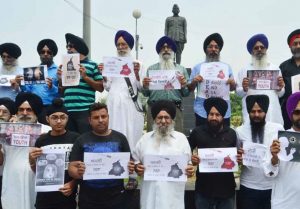 In Punjab, June had proved to be the cruellest month as dozens of deaths were reported from different parts of the State due to drugs overdose. Drug addiction, interestingly, was a major issue in the last Assembly elections in Punjab. Both Congress and Aam Aadmi Party had taken on the then ruling Shiromani Akali Dal and the Bharatiya Janta Party on this issue. So much so, a Cabinet Minister in the SAD-BJP government had been trolled for his alleged involvement in the drug addiction problem in the state. During his campaign and later after taking over reins of power in Punjab, Capt Amarinder Singh-led Congress government had promised last year to wipe out drugs from Punjab. But the situation seems to have further worsened. Punjab Health Minister Brahm Mohindra, however, dismissed the toll figure as highly exaggerated and claimed that “only two drug-overdose deaths were confirmed as per official records”.
In Punjab, June had proved to be the cruellest month as dozens of deaths were reported from different parts of the State due to drugs overdose. Drug addiction, interestingly, was a major issue in the last Assembly elections in Punjab. Both Congress and Aam Aadmi Party had taken on the then ruling Shiromani Akali Dal and the Bharatiya Janta Party on this issue. So much so, a Cabinet Minister in the SAD-BJP government had been trolled for his alleged involvement in the drug addiction problem in the state. During his campaign and later after taking over reins of power in Punjab, Capt Amarinder Singh-led Congress government had promised last year to wipe out drugs from Punjab. But the situation seems to have further worsened. Punjab Health Minister Brahm Mohindra, however, dismissed the toll figure as highly exaggerated and claimed that “only two drug-overdose deaths were confirmed as per official records”.
Media reports suggest that the first two weeks witnessed 17 deaths. In other words, one life snuffed out every passing day. Kuljeet Singh of Sawaddi Kalan village in Jagraon sub division of Ludhiana died on June 29 due to drug overdose. His body was cremated on July 2. Police found a spoon, a cigarette lighter and a syringe near the body, which was apparent evidence that he was doing drugs before he died. His wife Harpreet informed that her husband was admitted to a private de-addiction center in Rasoolra village in Khanna for more than two months and was discharged on June 21. On the fateful night, he went out of the house for the first time after being discharged from the centre. His mother Hardeep Kaur confirmed that he used ‘chitta’ (white powder).
Jotu of Gumtala in Amritsar too died due to drug addiction. His father Amar Singh told police that drug peddlers were quite active in the village. “I knew that he was addicted to alcohol, but I don’t know when he got into the narcotics.” Gurbhej Singh of village Dhotian in Tarn Taran district died on June 25. His mother Sawinder Kaur said that her son was a drug addict. “Drugs have snatched him away from us forever and I found a syringe of drugs still in his vein when he died.”
Lavpreet of Talwandi Sabo in Bathinda died on June 30. His father Jeevan Khana confirmed that “Lavpreet got hooked to drugs about two years back after he came in contact with some bad elements and used to take chitta”. In Kotkapura under Faridkot district, Balwinder Singh died on June 22. When his body was found from fields, a syringe was still in his hands. Saurav and Nitin died in Jalandhar due to drug addiction. They were lying unconscious in Amar Nagar. Police recovered drug injections and some other banned substances near the bodies.
Sukhjinder Singh of Fatehabad in Tarn Taran district died on June 6 due to drug-overdose. His wife told that “earlier he used to only drink, but after coming in contact with some smugglers of Fatehabad and Goindwal Sahib, he started taking drugs”. She said that his body was found in the house of a smuggler in Goindwal Sahib, “with a syringe still in his vein”.
Kamal Kant Maheshwari of Rama in Bathinda died on June 10 due to drug overdose. Shivam of Ferozepur died on July 1. His father Ashok Kumar said that his son was an assistant mechanic in an auto shop where he fell into bad company. “Initially, he was taking tablets, but later became addicted to ‘chitta’”. Basant Singh of Khai Pheme village in Ferozepur got trapped into the drug menace and stated taking “injections”, said the family.
‘CUT’ DEATHS
Investigations by the police have revealed that it is the deadly cocktail of adulterated heroin mixed with other substances, called “cut” in local parlance that is proving to be deadly to drug addicts in Punjab. There is unprecedented fear in families that the ‘cut’ is causing. ‘Cut’ is not a new drug, but an adulterated form of heroin. It is like injecting cement in one’s body. It reacts so fast that the victim can’t even take out the syringe and dies instantly. DGP Suresh Arora said, “All IGs, DIGs of ranges and CPs have been asked to probe each of the recent cases. The police will work closely with the Health Department as well as civil society groups in the field of de-addiction and rehabilitation of drug addicts.They have been directed to act against drug smugglers to choke the supply chain.”
Faced with criticism from several quarters over alleged spate of deaths due to drug overdose in the state, the Punjab cabinet has decided to recommend to the Centre death penalty for drug peddlers and smugglers. The decision was taken at a meeting of the Cabinet, chaired by Chief Minister Capt Amarinder Singh, which resolved to send a formal recommendation soon to the Union Government to this effect, according to an official spokesperson. The chief minister had called for the meeting to discuss the issue, particularly in the context of the recent spate of deaths due to alleged drug overdose and adulterated drugs in the state.
The Cabinet decided to constitute a special working group under the chairmanship of Additional Chief Secretary (Home) NS Kalsi to review and monitor, on a day-to-day basis, the action being taken to check and control drug abuse. The special working group constituted to review and update the government strategy against drugs will have ACS (Health), DGP (Law & Order), DGP (Intelligence) and ADGP (STF) as members. A cabinet sub-committee has also been formed under the chairmanship of the chief minister, with the special working group mandated to report directly to it. Health and Social Security Ministers have been appointed members of the sub-committee which will meet once a week to take stock of the situation and review the progress of the anti-drug campaign of the government.
The AAP and SAD have hit out at the Congress regime for allegedly failing to fulfil its pre-poll promise of curbing drug menace in the state within four weeks of coming to power. Amarinder Singh has also ordered a probe into the recent spate of drug-related deaths in the state and directed officials to take action against culprits.
STAFF DOPE TEST
The chief minister has announced that all employees of the Punjab Government would have to undergo a dope test every year. Leader of AAP, the principal opposition party in Punjab sent a letter to Amarinder Singh suggesting him to review the controversial dope test order as it could shift the political discourse from the burning issue of police-drug mafia nexus. The letter said that “feeling the pinch many government employee unions have demanded dope test of the political class of the state as well. In order to avoid social stigma many political leaders including Ministers, MLAs, etc. have made a beeline to get their dope tests done. As such the focus of debate has shifted from the real issue of drug mafia having deep connections with the police officers of the state, to a non-issue of dope test”.
The recent tweet by CM Capt Amarinder Singh said, “I have ordered @PunjabPolice DGP to probe all recent drug related deaths and to take exemplary action against anyone found responsible for the deaths of these innocent youths. Government will also assist the affected families in rehabilitation” .
Punjab that successfully brought in Green Revolution, then fought against terrorism, seems to be trying hard to fight a successful battle against drugs.
POLITICS RULES
Strangely, nobody in the political furore created over these deaths bothered to ponder over the question as to how the neighbourhood, family, police, local political workers, leaders of all hues failed to notice and report when victims were alive and in the grip of menace. Noise was made only over the dead bodies. Statements were made castigating the ruling party and the government.
In what is essentially a problem that has roots in the individual behaviour, social milieu and economy, a collective response from society and its organs of governance is what is required to take the problem head on. There seems consensus on this but,
unfortunately, politics takes the front seat. Recently, Akali Dal offered of a combined strategy was outrightly rejected by the government. On the other hand, elected representatives are undergoing dope tests only to show political one-upmanship.
“Community involvement is must for containing the alarming problem which sadly has not happened till now, said Dr SS Johl, a Ludhiana-based agricultural economist of international repute. He is part of a civil society group which organised peaceful demonstrations all over the state in the first week of July in the wake of recent deaths.” Our role is complementary to the government of the day. We are motivating, encouraging people to take stand against drugs not the government in order to get over the problem,” he added.
For one thing, the police and experts’ explanation of recent deaths as fallout of choked drugs supply chain after the STF launched crackdown on drug suppliers sounds plausible though the Opposition is unimpressed for its own reasons. This mutual political mistrust is the real undoing. The people at grassroot are availing the government facilities of de-addiction and rehabilitation as the numbers show. New initiatives like Drug Abuse Prevention Officers (DAPO) and Neighbourhood Buddy to lend emotional healing touch and prevent stagmatisation the addict have been launched. The state’s educational institutions have been roped in for awareness. Yet, the short-sighted politics fuels public mistrust.
NO QUICK SOLUTION
There cannot be quick solution to the problem as it has not cropped up overnight. About 30 years ago in Punjab, Opium was consumed predominantly in village but consumers were doing fine as they were mostly rich ones. Poppy husk was its cheaper alternative and did no life-threatening harm to its consumers on good numbers. In the second phase, about 20 years or so later, the younger lot started taking “medical nasha” as part of which they used to take drugs for medicinal purposes like cough syrups, capsules as well as some concoctions in large quantities to get high.
Heroin or white powder (chitta) which is derived from Opium in a laboratory arrived on the scene about 15 years ago. Around this time, the farming in Punjab started becoming increasingly less remunerative incidentally, the state witnessed real estate boom. The prices of agricultural lands and those around cities and town shot up. Due to this, initially the youth had the money to afford this costly addiction of chitta. Over a period of time, this boom subsided and this addicted set of youth became small drug peddlers selling very small quantities of either one gram, five grams to earn money to survive addiction. Over 18000 arrests made in Punjab comprise mostly of these small peddlers.
Experts are of the view that the government and society must realize that the addiction has been there since times immemorial. Time has come to think out of box rising above political interests to contain the menace through pragmatic measures. “In the present situation, the only choice is how much of which addiction the society wants to have at a particular phase in time and that choice is relative at best. From that perspective it makes sense to liberalise milder intoxicants. The government must take along communities to combat the problem,” suggested Prof. AK Kala, a leading psychaitirst who runs two hospitals in Ludhiana offering acute care and long term care of addicts.
NEW POLICIES SET TO INJECT HEALTH AMONG DRUG ADDICTS
Scores have died of drug overdose in various parts of Punjab in recent past. While the present administration is blaming the previous state government for its inaction to deal with the drug addiction and related threats to the society, the latter is questioning the apathy of the existing setup for it. PUNJAB HEALTH MINISTER BRAHM MOHINDRA discusses the issue with RAJU WILLIAM and tells him what measures the government has taken so far to handle the drug menace.
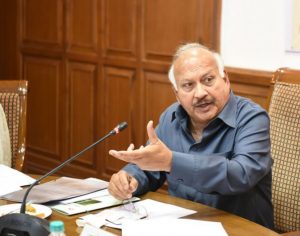
There is huge furore over recent deaths due to drugs. Your government had pledged to wipe out the menace in four weeks of coming to power. As the state health minister and senior-most cabinet minister, what is your take on this?
See, this is a big and complex issue. There are social and psychological factors involved. It is there for quite some years as apparently little was done by the previous government. We have set up a Special Task Force which choked the supply chain. Some anti-social elements seem to be taking advantage of such situation by indulging in supply of some deadly mixture to victims of substance abuse which is proving fatal.
How many officially confirmed drug-related deaths have been reported till date in the state?
Neither the state health department nor the police have any data of such deaths for last 10 years. The reason may be that families do not normally report fearing social stigma.
You said that the supply chain has been choked, but the people hooked to substance abuse need a proper reform mechanism once the supply is stopped. Is your department equipped to handle such victims?
Yes, this is absolutely a very valid question. We all know once the supply is stopped to any drug abuse victim requires an immediate rehabilitation system. We have already put in place a robust system of medical facilities, completely based on a new revised approach recommended by leading psychiatrists of global repute.
What is the new approach to rehabilitate the substance abusers?
As soon as we came to power, we studied the models of various countries affected by drugs and the strategies adopted by them. As guided by our CM, experts’ opinions were taken to prepare rehabilitation strategy in the form of a completely new mechanism Outpatient Opioid Assisted Treatment (OOAT) launched by our government.
What is an OOAT clinic?
It is an OPD-based clinic with trained manpower. The department followed the need-based approach that required people only with severe problem to be admitted in the in-patient facilities whereas others can be treated in OPD facility. The psychiatrist of the district is its overall in-charge. Here a patient is examined by the Psychiatrist or Medical Officer trained for de-addiction. This program was launched in pilot phase in Amritsar, Moga and Tarn Taran districts in October 2017 and later extended to rest of the state in May 2018.
How do you respond to the allegation not all OOAT centres are functional due to lack of facilities especially the shortage of medicines?
This is absolutely wrong allegation. We have 81 OOAT centres functional across all the districts, which are running successfully. There are total 8,121 patients in OOAT clinics, out of which 6,897 patients are re-visiting, which means a very high retention rate of 84.93 per cent. Total 2,71,098 people have availed this OPD service and provided 8,02,295 Buprenorphine tablets which is the key medicine.
With this new strategy in place, will your government close down de-addiction and rehabilitation centres?
No, rather we have strengthened the existing centres and renamed them as NavJeevan Kendras and NavNirman Kendras so that stigma of being addict does not stick. We are running five model 50-bed de-addiction centres having a qualified Counsellor complete availability of all important medicines including Buprenorphine- naloxone and Tramadol. Besides 32 government centres at district and sub-division hospitals, there are around 96 10-bed private centers licensed by the government. There are 22 rehabilitation centres working where patients go after detoxification at de-addiction centres.
What do you think could help reverse the deadly trend?
Emotional touch, I believe, can really help wean back the victims from drugs besides community awareness up to the grass root level. We are launching a major campaign involving interpersonal communication, mass media and social media to combat the menace.
PUNJAB POLICE GET TOUGH ON DRUG ABUSERS
Punjab Director General of Police SURESH ARORA recently issued strict directives to the field officers to step up their crackdown on the activities of gangsters and drug smugglers, making it clear that they would be held accountable for any activity of drugs smuggling in their areas. Arora discusses with RAJU WILLIAM his plans to curb drugs menace in the state.
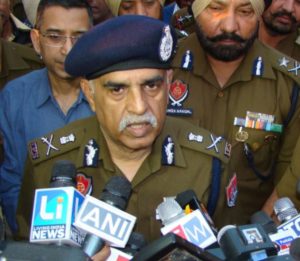
The state police are under fire over complicity of its officials in drug trade. What’s your reaction to the charge?
Yes, there have been instances of police officials in such cases but strict action has been taken. Recently a Deputy Superintendent of Police was dismissed from service. Also, action was initiated against some SHOs too. But let me tell you such instances are an aberration in the police force comprising 75,000 employees.
Cases have come to light where smugglers/peddlers lodged in jails are running drug trade from inside. What is being done to break their nexus outside?
The only way to tackle this problem is to cut off communication of drug convicts with their outside links. For this, a high security jail is coming up at Bathinda having capacity to lodge 1500 inmates mostly involved in drug trade as well as hardened criminals. It will have all the high-tech security equipment including jammers. The state government has also requisitioned two companies of Central Industrial Security Force to control access to eight jails in the state.
What is the exact number of smugglers/peddlers arrested and narcotic substance seized since new government came to power in 2017?
Total 17,094 cases were registered under NDPS Act and 18,977 persons arrested between March 2017 and June 2018. This shows the massive offensive launched against the drugs in the state. There is not let up in this offensive.
Given the recent spate of drug-related deaths, do you think challenges for police on drugs front have increased?
To talk about challenges, this is what police are for, always scaling those at hand and preparing for the new ones. Here I would also say even a single death is unfortunate. We have been able to choke the drugs supply line but I must say that is not enough. The demand has also to be reduced. Due to difficulty in procuring drugs, addicts are resorting to other synthetic drugs and concoctions through injections which are proving fatal. So, all the state agencies are focusing on reduction of demand through awareness campaigns and effective de-addiction, rehabilitation measures. We have also decided to register cases under section 304 of the IPC so that cases of drug-related deaths are investigated comprehensively from all angles.
How do you rate the performance of the Special Task Force (STF) against drugs set up in 2017?
I would say the STF has done well but still there is scope to do a lot more with additional resources and experience since it was set up as a dedicated body only a year ago to meet challenges of drugs. After review, the government has decided to bring it under the purview of the state police. The formal notification is under consideration. The Drug Abuse Prevention Officer (DAPO) programme under it is expected to generate a lot of awareness among people in coming time.
Since there is consensus on need of community involvement in dealing with drugs problems. What initiatives the Punjab police have taken in this direction?
Police primarily need to create confidence in the community that instead of punitive action, it will facilitate treatment of addicts. We intend to resume the practice of village level visits by police officer for the purpose. During my tenure as the DGP under the previous government, we had covered over 25,000 villages. I also visited villages along with my officers. Another important aspect to achieve the purpose is that there is zero tolerance towards corruption at the police station level. Also Helpline 181 is there for people for drug-related information and tips. All details about addicts are kept confidential. We are also starting awareness campaign to reach out to youths in educational institutions right from school level.
CM ASSURES END TO DRUG ABUSE IN PUNJAB
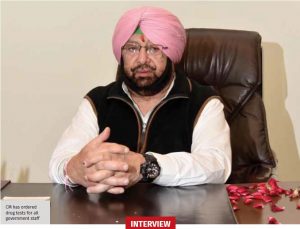
Estimates vary but by some accounts as many as two-thirds of households in Punjab have a drug addict in their midst. Prisons in the state are overcrowded with drug-users and peddlers. Streets and farms too witness the easy availability of narcotics and opiates. Last year the government arrested 18,977 peddlers and treated some two lakh addicts. PUNJAB CHIEF MINISTER AMARINDER SINGH discusses with RAJU WILLIAM his action plan to save the state from the clutches of drug abuses.
Any change in your perspective on handling of drugs issue in the state since you took over its reins 15 months ago?
I don’t know what you mean by change in perspective. If anything, my resolve to wipe out the menace and save our kids from drugs has strengthened further. These drug smugglers and peddlers have ruined our state and our future generation. I will not let this continue, come what may. This is a promise I made to myself before the Assembly elections and I stick by it.
Major allegation by the Opposition is that big fish in drugs trade still out of net. Is it so?
Some have fled the country, but they are on our radar, and the STF and state police, along with other state and central government agencies, are pursuing them. I have made it clear to them — chase these criminals to the other corner of the world, if need be, but I want them back to face punishment for their deeds. We will not allow them to go scot-free. We owe this to ourselves, and more importantly to our children.
It is being alleged that the wings STF set up for the purpose are clipped and it’s not being allowed to get at bottom of the drug trade. Your take on this?
There is no question of clipping their wings. I had set up STF with the single-minded purpose of breaking the backbone of drugs. And for this, I gave them a free hand, which they used the power to the fullest to bring the drug mafia to its knees and push drugs out of the reach of our youth. Recently, we decided to bring them under the purview of the Punjab Police to enable them to have recourse to all the manpower and other resources that are at the disposal of the force. However, they will still continue to operate as an independent agency – like the Vigilance or the Intelligence bureaus. Their mandate is clear — they have to get to the bottom of this drug trade come what may, and ensure that Punjab becomes drug-free, once and for all.
How do you think your ideas of death penalty to first time offenders; mandatory dope test could make difference?
More than anything, I feel these will become deterrents for those tempted by the easy money to take on drug trading. They will know that even one mistake, or one step in the direction of drugs, will led them to the gallows. The message will go down loud and clear — this is too serious a crime for us to allow you even one deviation from the law. I am sure this will instil a sense of fear in the minds of prospective drug criminals. As for the mandatory dope test, it will convey that anyone doing drugs, even for fun, will stand to lose their chances of getting a job, in the first place, or being obstructed in their career progression. I know these are strong measures but then the situation, in my opinion, merits strong steps.
The recent responses of your government are being seen more as defensive after the issue returned to focus due to recent spate of deaths. Do you apprehend losing political ground?
Do you call death penalty or mandatory dope test defensive measures? Definitely, the recent spate of drug deaths prompted our decisions. But, let me make it clear, these decisions are not defensive. Rather they are among the sternest measures any government can take to tackle such a heinous problem, short of the kind of summary punishments doled out in certain countries.
Your government’s action plan since coming to power reportedly resulted in arrests of over 18,000 drug peddlers; treatment of over 2 lakh addicts. Still what do you think is lacking?
You’ve yourself given the numbers. Going by these numbers, the one thing that is definitely not lacking is the will to wipe out the menace. Resources were lacking for the STF and since our financial situation did not permit us to make the same available to them, we decided to put the resources of our police force at their disposal. Nothing, I repeat, nothing will be allowed to come between my government’s resolve and elimination of the drug problem.
How do you view the way Opposition is flagging the issue?
How are they flagging it? It is the Congress, led by Rahul Gandhi, which flagged the issue three years ago. The Opposition is the one which has been responsible for the mess in the first place.
The Akalis, by their active or passive connivance, allowed the drug mafia to flourish in the 10 years of their rule. As far as AAP is concerned, there have been several cases and allegations of some of their top leaders in Punjab being involved in drugs. What they are now doing is trying to take political mileage from the issue. It’s sad that the Opposition is trying to exploit such a serious and sensitive issue to their advantage.
letters@tehelka.com







